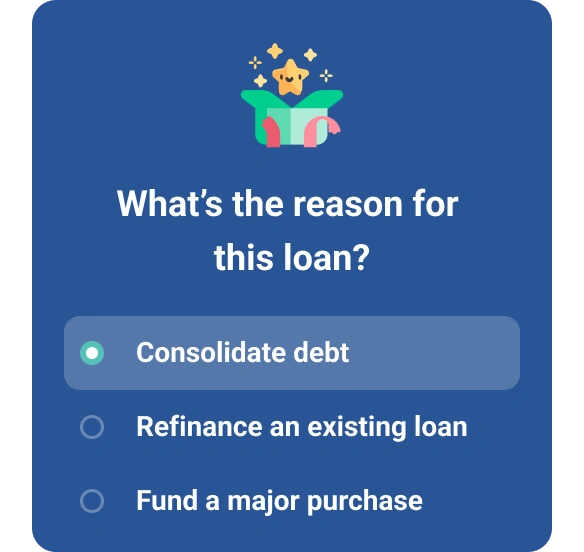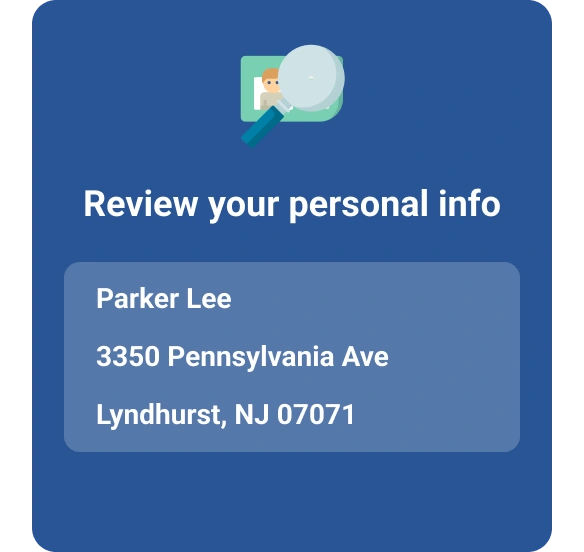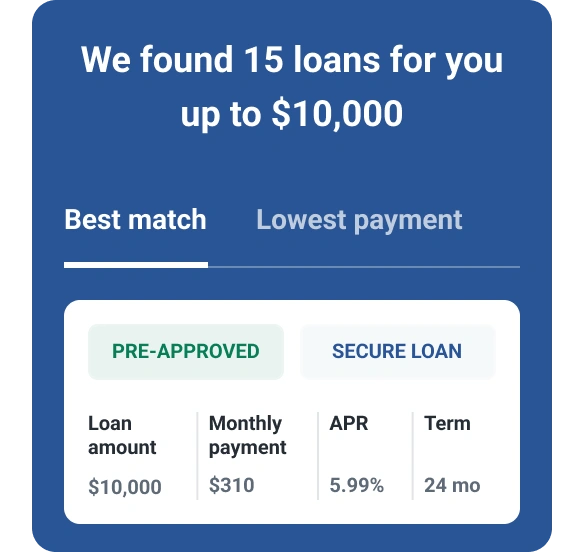How to Get a Debt Consolidation Loan
Quick Answer
Debt consolidation loans allow you to combine several debts into one loan with one payment. Here’s how:

High-interest credit cards, medical bills and other types of debt can place significant strain on your budget. However, a debt consolidation loan may help give you some financial breathing room by combining multiple debt balances into one account with a single payment—ideally at a lower annual percentage rate (APR). This type of personal loan can make it easier to manage your debt, lower your interest costs and help you zero out your debt sooner.
Debt consolidation loans have a fixed interest rate and a set repayment term, typically ranging from two to five years. You'll have a set end date and won't be stuck in a seemingly endless cycle of credit card payments that barely chip away at the balance.
You can get a debt consolidation loan by following these steps.
1. Evaluate Your Financial Situation
Before starting the process, review your debt and weigh the pros and cons of debt consolidation to make sure a debt consolidation loan would truly benefit you. A debt consolidation loan may make sense if it:
- Saves you money: A debt consolidation loan works best when you can replace high-interest debt—like credit card balances—with a lower-rate loan. The average credit card interest rate is 22.80%, while the average rate for two-year personal loans is over 10 points lower at 12.32%, the most recent data from the Federal Reserve shows. Run the numbers through a credit card payoff calculator to see if debt consolidation could save you money.
- Provides a clear repayment timeline: With revolving credit like credit cards, you borrow and repay funds on an ongoing basis. If you only make minimum payments, your payoff date will likely be in the distant future. Paying only the minimum 4% on a $1,500 balance, for example, could take up to eight years to pay off. By contrast, personal loans come with a fixed repayment term—usually five years or less—potentially making it easier to budget and pay off debt faster.
- Pays off your debt sooner: Choosing a shorter-term loan you can comfortably afford allows you to speed up your repayment schedule and save on total interest charges.
- Lowers your monthly payment: Choosing a longer-term loan may reduce your payment, but it also means you'll pay more in interest charges over time.
While a debt consolidation loan could save money and make it easier to manage your debt, it may not be a good option if:
- It charges a higher interest rate: If your credit is below average, you may not qualify for a lower interest rate than what you currently pay. In that case, consider taking the time to improve your credit before applying for a personal loan or use other methods of debt payoff, such as the debt avalanche or debt snowball strategy (more on these below).
- It results in more debt: Debt consolidation loans wipe out your credit card balances by transferring the debt to an installment loan. But if you continue to use the cards, you could rack up new charges on your newly paid off accounts and end up with more debt than when you started.
- Your debt balances are low: If you can pay off your existing debt in less than a year, the savings from a debt consolidation loan may be too minimal to be worth pursuing.
2. Determine How Much You'll Need
While you're at it, take a close look at your debts to figure out exactly how much you'll want to consolidate. Make a list of all the debt accounts you plan to include, along with their payoff amounts, interest rates and monthly payments. Add up your payment amounts to determine the total amount of your consolidation loan.
Next, tally up your current monthly payments to calculate an affordable payment amount with your new loan. Aim to find a debt consolidation loan with terms that fit comfortably within your budget, ideally with a substantially lower interest rate.
Learn more: Personal Loan Do's and Don'ts
3. Check Your Credit
There's no specific credit score you must meet to qualify for a debt consolidation loan. But generally speaking, the higher your score, the better your odds of approval and favorable terms. Finding out what range your credit score falls into can help you understand where you stand and what APR you might get.
You can start by accessing your Experian credit report and FICO® ScoreΘ for free. You can also get free weekly copies of your credit reports from Equifax and TransUnion at AnnualCreditReport.com. Once you have these, you'll see what lenders see when evaluating your application and setting your rate. Look over your report for issues and, if necessary, take steps to improve your credit.
4. Compare Debt Consolidation Loans
It's a good idea to shop multiple lenders and compare different loan offers to find the best possible deal. When you find the loan you want, prequalify first to check your chances of approval without affecting your credit score.
Consider the following factors as you compare loan offers.
- Interest rates: Since a debt consolidation loan is supposed to save you money, it's important to make sure your new interest rate is lower than your existing rates. Remember, rates vary by lender, so check your own bank, credit unions and online lenders to get a broad range of rates and terms available. You can also check Experian's marketplace for a wide variety of debt consolidation loan offers.
- Loan fees: Keep an eye out for loan origination fees, which range from 1% to 12% and can offset the savings from a lower interest rate. Some lenders waive the fee for borrowers with good or excellent credit. Also check for prepayment penalties, which can cost up to 2% if you pay off your loan early.
- Total loan cost: Before formally applying for the loan, consider your potential savings in the long run. For example, let's say you have $10,000 in high-interest credit card debt with an average APR of 29%. You'd have to make payments of around $419 per month to pay off the balance in three years, with interest charges totaling $5,086. If you consolidated this debt into a new loan with a 12% APR over the same period, your payment would drop to $332 and your interest charges would plummet to $1,957, saving you $3,129.
5. Apply for a Debt Consolidation Loan
Once you find the best loan offer, it's time to take the next step and formally apply. Fortunately, the process is relatively straightforward. You can apply online, by phone or in person in minutes. You'll need to provide some personal, employment and income information as well as your reason for borrowing. Be prepared to submit documents that verify your identity, address and income.
The lender will perform a hard credit pull to review your creditworthiness, which may temporarily lower your score by a few points. Online lenders can often approve your loan application in a few minutes, while traditional banks and credit unions may take longer. If approved, carefully read the loan documents to make sure the terms are what you've agreed to and look for any origination fees that could increase your total loan costs.
6. Close the Debt Consolidation Loan
Before signing anything, make sure you fully understand and agree with the loan terms. If everything looks good and you're ready to move forward, sign the agreement to close the loan and receive the funds.
Debt consolidation loans are usually funded in one of two ways:
- Lender pays creditors. You may have the option for your lender to pay your creditors directly. In that case, you'll need to provide them with account details, payoff amounts and other required information for the debts you want to settle.
- You pay creditors. You might prefer to have your lender deposit the funds into your bank account so you can pay off your debts yourself. Depending on the lender, you may receive the money as soon as the same day or within a few days.
Make sure to pay off your accounts right away before interest accrues and increases your final payoff amounts. Check your account online or call your creditor to make sure the balance is fully paid before closing any old accounts.
If you think you'll be tempted to rack up a big balance on your newly paid-off credit cards, closing them can help prevent additional debt. However, keeping an older credit account open can help you maintain a lower credit utilization ratio and a longer credit history, which accounts for 30% and 15% of your FICO® Score, respectively. If you do keep a card open, use it sparingly and pay off the balance in full each month to avoid interest charges and new debt from adding up.
Learn more: Should You Cancel Your Unused Credit Cards or Keep Them?
Frequently Asked Questions
Keep an Eye on Your Credit While Paying Off Debt
As you pay down your debt, you can also benefit by tracking your credit score. Experian's free credit monitoring service gives you access to your Experian credit report and FICO® Score and real-time alerts when changes are made to your credit report.
This essential resource can help you see how your payments and other financial moves impact your credit score over time, helping you stay motivated and make better decisions as you work to get out of debt.
Find out what debts you owe
Your free credit report lists all your debts, such as credit card balances and loans, helping you create a plan to tackle your debt and improve your financial health.
Review your creditAbout the author
Tim Maxwell is a former television news journalist turned personal finance writer and credit card expert with over two decades of media experience. His work has been published in Bankrate, Fox Business, Washington Post, USA Today, The Balance, MarketWatch and others. He is also the founder of the personal finance website Incomist.
Read more from Tim

